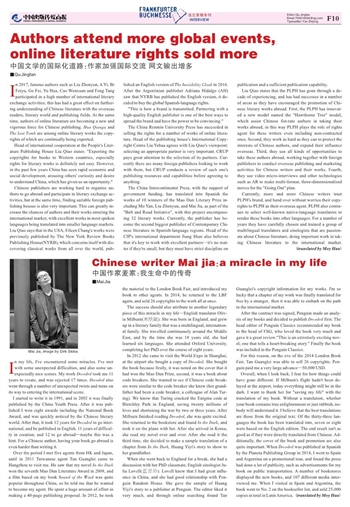In 2017, famous authors such as Liu Zhenyun, A Yi, Bi Feiyu, Ge Fei, Yu Hua, Cao Wenxuan and Feng Tang participated in a high number of international literary exchange activities; this has had a great effect on furthering understanding of Chinese literature with the overseas readers, literary world and publishing fields. At the same time, authors of online literature are becoming a new and vigorous force for Chinese publishing. Hua Qiangu and The Lost Tomb are among online literary works the copyrights of which are continually being exported.
Head of international cooperation at the People's Literature Publishing House Liu Qiao states: "Exporting the copyrights for books to Western countries, especially rights for literary works is definitely not easy. However, in the past few years China has seen rapid economic and social development, arousing others' curiosity and desire to understand China, which has given us an opportunity."
Chinese publishers are working hard to organise authors to go abroad and participate in literary exchange activities, but at the same time, finding suitable foreign publishing houses is also very important. This can greatly increase the chances of authors and their works entering the international market, with excellent works in most spoken languages being translated into smaller language markets. Liu Qiao says that in the USA, Eileen Chang's works were previously published by The New York Review Books Publishing House(NYRB), which concerns itself with discovering classical works from all over the world, published an English version of The Invisibility Cloak in 2016. After the Argentinian publisher Adriana Hidalgo (AH) saw that NYRB has published the English version, it decided to buy the global Spanish-language rights.
"This is how a brand is transmitted. Partnering with a high-quality English publisher is one of the best ways to spread the brand and have the power to be convincing."
The China Renmin University Press has succeeded in selling the rights for a number of works of online literature. Head of the publishing house's International Copyright Centre Liu Yehua agrees with Liu Qiao's viewpoint: selecting an appropriate partner is very important. CRUP pays great attention to the selection of its partners. Currently there are many foreign publishers looking to work with them, but CRUP conducts a review of each one's publishing resources and capabilities before agreeing to anything.
The China Intercontinental Press, with the support of government funding, has translated into Spanish the works of 10 winners of the Mao Dun Literary Prize including Mo Yan, Liu Zhenyun, and Mai Jia, as part of the "Belt and Road Initiative", with this project encompassing 32 literary works. Currently, the publisher has become the second biggest publisher of Contemporary Chinese literature in Spanish-language regions. Head of the CIP's international department Jiang Shan also believes that it's key to work with excellent partners—it's no matter if they're small, but they must have strict discipline on publication and a sufficient publication capability.
Liu Qiao states that the PLPH has gone through a decade of experiencing, and has had successes in a number of areas as they have encouraged the promotion of Chinese literary works abroad. First, the PLPH has innovated a new model named the "Hawthorne Tree" model, which assist Chinese fist-rate authors in taking their works abroad, in this way PLPH plays the role of rights agent for these writers even including non-contracted ones. Second, they work as hard as they can to protect the interests of Chinese authors, and expand their influence overseas. Third, they use all kinds of opportunities to take these authors abroad, working together with foreign publishers to conduct overseas publishing and marketing activities for Chinese writers and their works. Fourth, they use video micro-interviews and other technologies such as AR to make multi-format, three-dimensionalised moves for the "Going Out" plan.
Currently, more and more Chinese writers trust PLPH's brand, and hand over without worries their copyrights to PLPH as their overseas agent. PLPH also continues to select well-known native-language translators to render these books into other languages. For a number of years they have carefully chosen and trained a group of multilingual translators and sinologists that are passionate about Chinese literature, doing important work in taking Chinese literature to the international market. (translated by Moy Hau)


